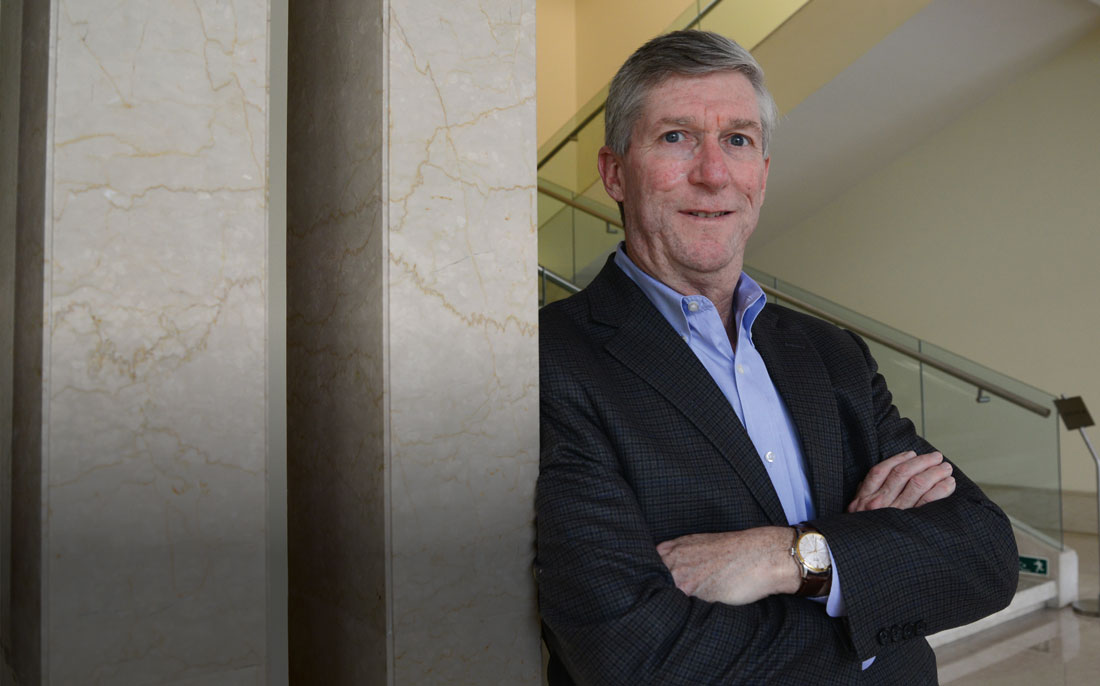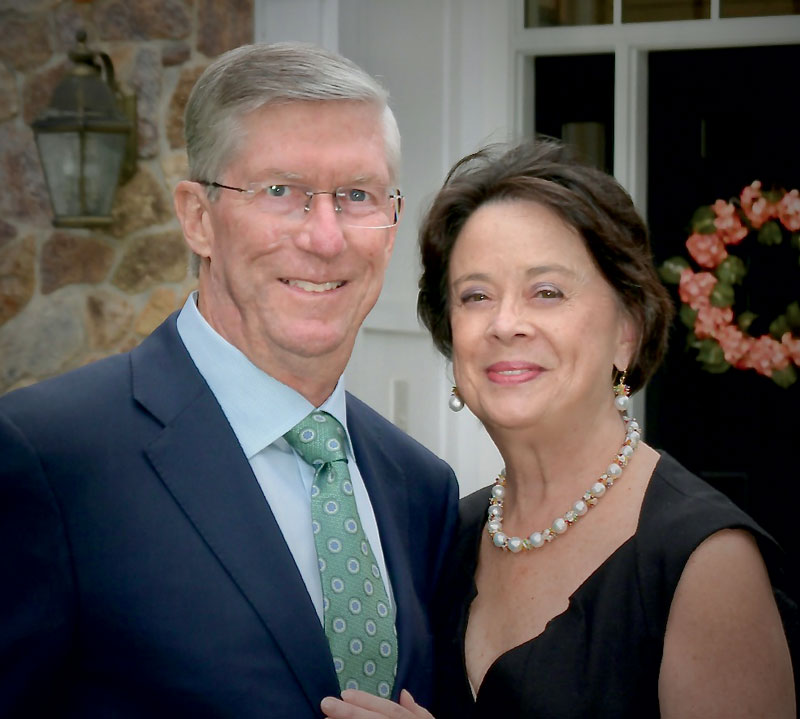
“There are many health-related activities at Lehigh, but there has never been a strategy to scale these efforts,” says new Lehigh Board of Trustees Chair Vince Forlenza. “We have that opportunity now.” (Photo courtesy Ramesh Pathania/Mint/Getty Images)
As CEO of Becton, Dickinson and Company, chemical engineering alumnus Vincent Forlenza ’75 led BD’s transformation from a medical supply manufacturer to a global powerhouse in the medical device, diagnostic, and life sciences sector. In that role, he also orchestrated numerous public-private partnerships—increasing access to low-cost diagnostics and expanding vaccination programs, for example—aimed at improving health care in developing countries. A steadfast supporter of Lehigh’s academic and research mission and a university Trustee, Forlenza was a central figure in the development of the College of Health and the new Health, Science and Technology Building, providing strategic insight drawn from his nearly 40-year career at the intersection of health, technology, business, and corporate social responsibility. Following his retirement as BD’s executive chairman, Forlenza was tapped to chair Lehigh’s Board of Trustees. From that post, he continues to champion the integration of engineering and health-focused research as a path toward greater innovation and equity.
Q: Surmounting challenges in global health care has been your career focus. What do you find most compelling about this work?
A: The most compelling aspect is the ability to have a large and rapid impact on people’s lives. For example, working with countries around the globe to build basic diagnostic testing capabilities made a difference to individuals and societies as they battled HIV and other infectious diseases. In addition, it gave me the opportunity to partner and work with outstanding people from organizations such as the U.S. President’s Emergency Plan for AIDS Relief (PEPFAR), the Gates Foundation, the Clinton Global Health Initiative, and others.
 Q: How has your engineering background guided you in managing complex organizations and finding the right approach to issues related to human health?
Q: How has your engineering background guided you in managing complex organizations and finding the right approach to issues related to human health?
A: My engineering education taught me how to solve multivariable problems, or in other words, how to deal with complexity and uncertainty. Engineering was a great foundation to then broaden my knowledge in other fields, such as finance, management, and social issues, as I built my career. Solving global health issues requires understanding not only the basic technologies but all the other dimensions of the problems as well. Running large organizations requires aligning people to solve multidimensional problems effectively, usually in multifunctional teams. I believe it is easier as a leader in a technology-driven organization to start with the knowledge of the science and technology than with the nontechnical aspects. The ability to integrate both is key in leadership positions. Consequently, I am a big supporter of the integrated learning approach that Lehigh President Joe Helble is advocating.
Q: What do you see as the biggest challenges facing health and health care?
A: Globally, it continues to be access and cost, which, I think, will remain as major challenges in the future. Climate change, politics, lack of basic health knowledge, misinformation, and pandemics are also making the challenge more difficult. At the same time, new scientific knowledge and technologies are exploding rapidly and making cures for many diseases potentially possible. CRISPR, the gene-editing technology, is but one example. Society’s challenge will be to organize health systems in a way that integrates the social determinants of health with technology, cost, and access to reach broad populations. This is why the new College of Health is focused on population health and the improvement of the delivery of health care to all segments of society. Think health technologies for health equity.
Q: You emphasized the importance of an integrated approach. How will your role as Board of Trustees chair enable you to nurture a cross-campus integration around health and health care?
A: The Board strongly supports an integrated approach to learning, including expanding Lehigh’s cross-college programs to enable our graduates to solve problems and create opportunities in health as well as in other domains. One sees that issues in information-technology-driven businesses, such as social media, require a deep understanding of not just the technology but also social and political issues. The intersection of technology and the understanding of human behavior is key in all these areas. As chair, it will be my role to make sure the Board is aligned with the work President Helble is leading on strategic planning that will set priorities for Lehigh, including integrated and experiential learning.
Q: What role has Lehigh’s existing strength in engineering played in launching the College of Health?
A: Successful strategies often start with leveraging core capabilities and applying them in new areas. Capabilities in engineering are one of the fundamental strengths that Lehigh brings to this new endeavor. There are many health-related activities at Lehigh, but there has never been a strategy to scale these efforts. We have that opportunity now.
The College of Health and the Rossin College are working closely together as we build capability and strategy. Twenty members of the engineering faculty are already affiliated with the College of Health. Members of the engineering faculty participated in the College of Health’s research strategy session, which resulted in the hiring of two epidemiologists who will work closely with the engineering faculty. In addition, the colleges have made two joint appointments, Professor Bilal Khan (community and population health and computer science and engineering) and Assistant Professor Gabrielle String (community and population health and civil and environmental engineering). The colleges are also working on a joint undergraduate degree where students will work on real-world health problems requiring engineering solutions to provide health equity and improve health.
Q: Programs in bioengineering, healthcare systems, the Mountaintop Initiative, and Lehigh Business are also aligned with public health. Why is Lehigh’s culture so attuned to the needs in this space?
A: I think the pragmatic nature of the Lehigh faculty, administration, and students drives them to areas where they believe they can make a real difference. Most everyone has a family member or friend who has benefited from advances in health or been frustrated by the inefficiencies in the current U.S. healthcare system. I have also interacted with members of the Lehigh community whose experiences bring a global perspective of the needs for better health in the less developed countries. The pandemic certainly intensified this desire to improve global health.
Q: What areas of intersection between the College of Health and the Rossin College hold significant promise for innovation?
 A: These discussions are just beginning and will be influenced by the areas of research of the new faculty in the College of Health as they join Lehigh. The use of artificial intelligence and machine learning combined with new technologies and devices, including wearable monitors and diagnostics to enable further decentralization of quality care to the home and other settings, is one potential opportunity for collaboration. The bioengineering faculty is already expanding its strength in these areas. Faculty growth in the Rossin College has been primarily in data/computation and bioengineering. Health will be an application area for these foundational engineering capabilities in partnership with the College of Health.
A: These discussions are just beginning and will be influenced by the areas of research of the new faculty in the College of Health as they join Lehigh. The use of artificial intelligence and machine learning combined with new technologies and devices, including wearable monitors and diagnostics to enable further decentralization of quality care to the home and other settings, is one potential opportunity for collaboration. The bioengineering faculty is already expanding its strength in these areas. Faculty growth in the Rossin College has been primarily in data/computation and bioengineering. Health will be an application area for these foundational engineering capabilities in partnership with the College of Health.
Q: You and your wife, Ellen, (right) made a $5 million gift to fund a faculty chair in the College of Health. Why is this kind of support critical to a new academic enterprise?
A: Ellen and I believe that the endowed chair is a strong sign to the academic community that Lehigh is serious and highly supportive of the College of Health. The chair will enable the college to bring in unique talent that we can build on and should increase our capabilities for both research and partnerships.
Q: How does the College of Health present a growth opportunity for the Rossin College?
A: Partnering with the College of Health will enable Lehigh engineers to access a new set of capabilities, broaden their areas of impact, and tap into new funding. It will also be a wonderful way to expose students to interdisciplinary learning to broaden their perspective and career opportunities.
Q: What message do you have for current and prospective College of Health students about their own potential for impact in the evolving world of health and health care?
A: To our current students: You are trailblazers in a new discipline that will grow in importance. I look forward to seeing your success and impact as your careers progress. You will make a difference. To potential students: You will be entering a college that will prepare you for many pathways in health to improve a critical segment of society, and you will be surrounded by great people who share your passion.
